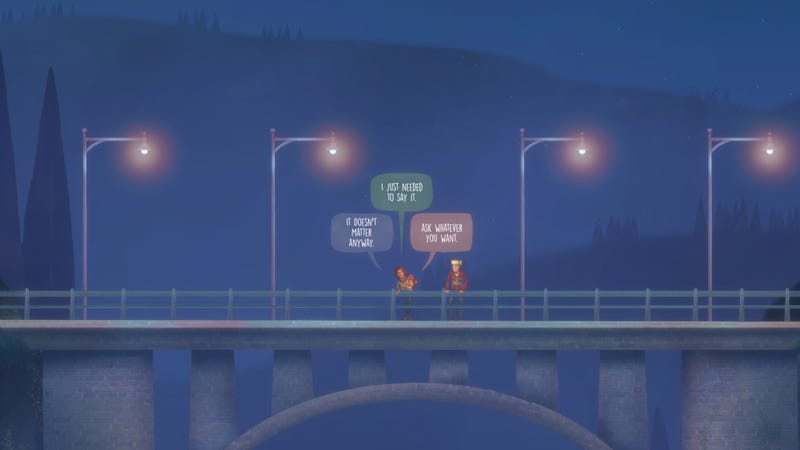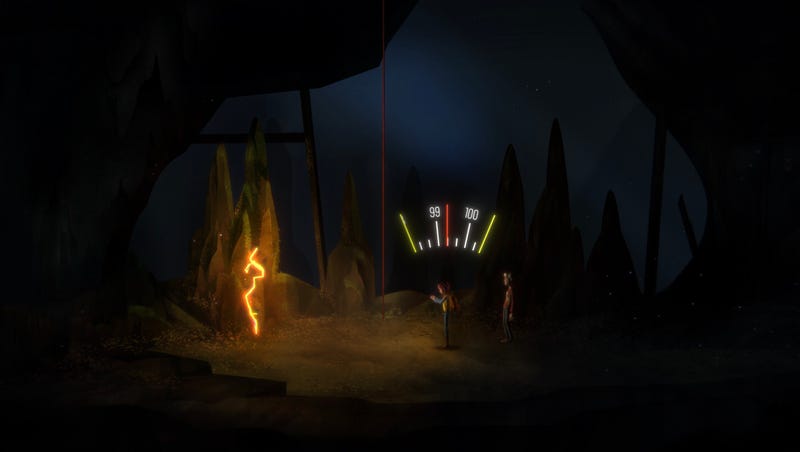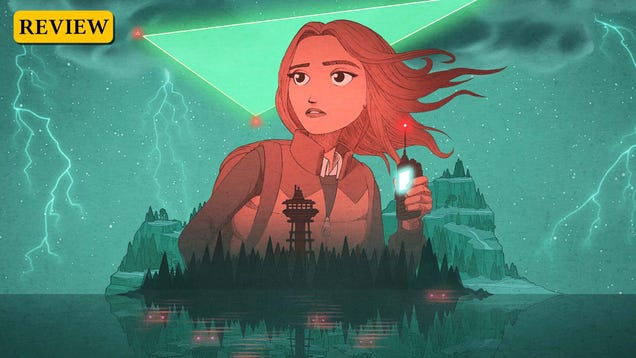Oxenfree II: Lost Signals plays something like a thematic flip of its excellent 2016 predecessor. Where the original game followed a teen named Alex and a group of her friends on a coming-of-age adventure that had the group confronting a nebulous future, Lost Signals finds 30-something Riley Poverly feeling stuck in adulthood and returning back to her childhood home, the mining town of Camena, in order to “start over.”
It’s an interesting flip on the usual coming-of-age story that makes the sequel feel refreshing, yet familiar—it’s not simply retreading the same ground with a new group of teens. As someone who’s experiencing a midlife crisis as his thirties are rapidly barreling down on him, Riley’s dilemma resonated with me. She wonders if she’s made the right choices in life, as well as questioning the impact she’s had on the people and the world around her.
Riley and her old high school acquaintance, Jacob, are given the assignment of going around Camena and placing antennas to track the strange signals that have been interfering with electronic equipment throughout town. No sooner do they place the first one than something strange happens on Edwards Island, the setting of the first game—and they go to investigate. Although Lost Signals is supposed to be a standalone story, I would highly recommend playing the original game first in order to understand why Edwards Island is so important. Otherwise, you might feel lost right off the bat. (Even Camena was briefly seen in the original game’s secret ending, though it’s greatly expanded on here.) Technically, yes, Riley’s story is her own. However, it’s full of references to the events of the first game, and characters from it make appearances as well. You’ll miss so much context if you don’t at least play the previous game once.

All of this plays out in scrolling 2D gameplay, as you navigate Riley through the beautiful hand-drawn environments of Camena and beyond. You’ll occasionally have to solve simple environmental puzzles by tuning Riley’s radio to match certain frequencies, and the occasional opportunity to venture off the beaten path in search of collectibles lends the action a bit of an adventure platformer vibe.
Still, Lost Signals is arguably more of a visual novel than an adventure game, and you’ll spend much of your time engaging in conversations and choosing between various dialogue options. The kinds of answers you choose will influence the ending. While a conversation about parents might seem minuscule, the way that Riley chooses to respond has colossal ramifications later on. Will you act mean-spirited and dismiss other people’s concerns? Or will you show kindness throughout the journey and have favors repaid down the line?
It’s not long before Riley and Jacob’s investigation into the mysterious signals haunting Camena begins to threaten their sanity. Along with other anomalies, phantoms with red eyes appear suddenly out of nowhere, speaking in cryptic messages and fragmented sentences, with words separated by static, invoking an uneasy feeling whenever you encounter them.

Naturally, witnessing such inexplicable horrors puts them on edge, and I loved the nonchalant dialogue between them as they tried to keep themselves from losing their minds. It’s surprising how entertaining it is to hear two people just discussing whether libraries should bring back late fees for overdue books.
But this isn’t all just idle chit-chat. For one thing, Jacob’s dynamic with Riley makes their interactions as revealing as they are entertaining. He’s different from her in that he’s never known life outside Camena, but also similar to her in the sense that they’re both trying to find their purpose in life. And secondly, the way Riley responds to Jacob and other characters will affect the ending. For example, If Riley is overly rude to Jacob or ignores his attempts to bond, then he might not follow her to the end. The conversations flow incredibly well—they all sound natural and realistic, thanks to the excellent script and phenomenal voice acting.
Lost Signals is also much better paced than its predecessor, with events delving much more quickly into the ghostly and supernatural in a way that grabs your attention and keeps you hooked. It does this, though, without sacrificing the quiet moments that helped make the first game so charming, with the banter between Riley and Jacob as they look for places to put down their antennas capturing much the same feeling of Alex and her friends riffing off of each other in the original.
One small but important improvement over the first game is the user interface. While playing Oxenfree, I remember being confused that the B button on my Joy-Cons was used to trigger an action as there was no indication of that. In Lost Signals, walking up to interactable objects like a ledge will show a big fat B with a circle around it, and similarly, other face buttons now appear when choosing between dialogue options.
Lost Signals makes excellent use of time-travel elements as well. Like Alex in the previous game, Riley will experience time loops throughout the story, giving us a glimpse into Camena’s dark past. Lost Signals sometimes has puzzles where Riley will have to tune her radio’s frequency to match a tear in space-time, ripping it open and stepping into the past. A caved-in tunnel might block Riley’s path, for instance, but by turning back time, she can jump to a period where it doesn’t. It makes for a very compelling gameplay mechanic similar to Titanfall 2’s time gauntlet. I just wish it were used more often.
The new primary antagonist, a cult called Parentage, tries to exploit Camena’s supernatural phenomena like time travel and space portals for its own ambitions. Because Lost Signals’ tone is more unsettling than scary, Parentage isn’t engaged in the kinds of truly grisly business you might get from something like Resident Evil’s Umbrella Corporation. In fact, throughout the game, as you come across murals dedicated to the cult, Jacob will even comment on how the group just seems a bit too interested in astrology and appear rather harmless.

As the story progresses, though, Riley and Jacob learn that Parentage’s members are more misguided than they are sinister. However, the organization’s methods still put lives at risk. Rather than just being bad for the sake of being bad, Parentage ends up being a crucial avenue of delivering Lost Signals’ themes of loss and yearning. Parentage’s goals act as a contrast to Riley’s. Whereas Riley is grappling with the consequences of her past decisions and struggling with how to move forward in life, some members of Parentage are unable to let go of their own past and want to relive a certain moment over and over again.
While I won’t go into spoilers, these themes are exemplified well in the game’s different endings. The casual conversations between Riley and Jacob as they explore Camena together serve as a foreshadowing of their fates. Jacob yearns to be remembered for something that matters. Riley has so much to look forward to in the future, but can she let go of her past in order to do so? As Parentage’s motivations became clearer over the course of the story, I actually found myself sympathizing with its members. In the end, I actually wound up giving them what they wanted.
Perhaps it was my desire to go back and relive my younger days that made me side with them. Many games feature sympathetic villains, but I never would proactively side with them. However, Lost Signals succeeded in making me do so.
While Oxenfree II: Lost Signals isn’t an overhaul compared to its predecessor, it didn’t need to be. It tells an excellent story with a cast of well-developed characters, and the smaller changes are what help define the sequel. Better pacing, smoother controls, and more interesting gameplay ideas make it a worthy follow-up to the supernatural coming-of-age story that first graced our hearts seven years ago.

Leave a Reply